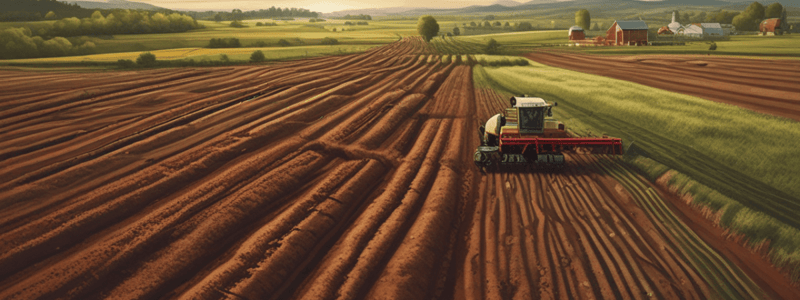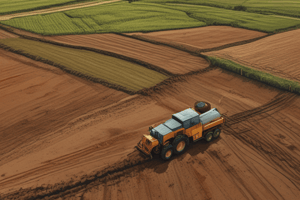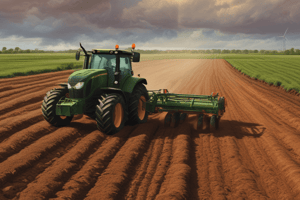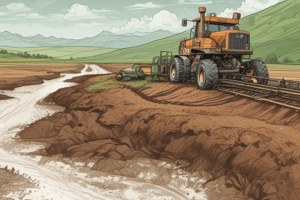Podcast
Questions and Answers
Why is soil management critical for crop growth and livestock farming?
Why is soil management critical for crop growth and livestock farming?
Soil management is critical for crop growth and quality fodder because nutrient-rich soil reduces the risk of deficiency diseases in crops and livestock.
What is the optimal pH level for soil health?
What is the optimal pH level for soil health?
The optimal pH level for soil health is between 6 and 7.
What is the purpose of soil testing in agriculture?
What is the purpose of soil testing in agriculture?
Soil testing helps determine nutrient levels and crop suitability.
What is the difference between inorganic and organic fertilizers?
What is the difference between inorganic and organic fertilizers?
How does the N-P-K ratio guide fertilizer selection?
How does the N-P-K ratio guide fertilizer selection?
What is the benefit of using manure as a fertilizer?
What is the benefit of using manure as a fertilizer?
Why is proper handling and storage of fertilizers and manure important?
Why is proper handling and storage of fertilizers and manure important?
What is the effect of poor soil drainage on crop productivity and environmental sustainability?
What is the effect of poor soil drainage on crop productivity and environmental sustainability?
What is the purpose of Biological Oxygen Demand (BOD) measurement?
What is the purpose of Biological Oxygen Demand (BOD) measurement?
What is the goal of sustainable agriculture?
What is the goal of sustainable agriculture?
Flashcards are hidden until you start studying
Study Notes
Soil Management for Sustainable Agriculture
- Soil management is crucial for crop growth and quality fodder production
- Balanced nutrients and optimal pH levels (6-7) ensure soil health
- Soil testing determines nutrient levels and crop suitability
- Fertilizers can be inorganic (e.g., CAN, urea) or organic (e.g., manure), varying in nutrient content and application methods
Fertilizer Selection and Application
- N-P-K ratio guides fertilizer selection based on crop needs (e.g., 10-10-20 for grassland)
- Organic fertilizers like manure (e.g., FYM, slurry) enrich soil with organic matter and nutrients
- Proper handling and storage of fertilizers and manure minimize environmental impact
Soil Conservation and Drainage
- Effective drainage reduces waterlogging and enhances soil structure, affecting crop productivity and environmental sustainability
- Pollution control measures include minimizing nutrient runoff and leaching, and monitoring Biological Oxygen Demand (BOD) for organic material breakdown in water
Sustainable Agriculture Practices
- Conservation practices (e.g., cover cropping, crop rotation) maintain soil health
- Compliance with regulations on fertilizer use and environmental protection is crucial
- Sustainable agriculture balances productivity with environmental stewardship
- Integrated pest management reduces reliance on chemical inputs, and crop and livestock rotation improves soil fertility and pest control
Optimal Farming Strategies
- Continuous education and adaptation to new technologies optimize farm efficiency
- Crop and livestock rotation is essential for maintaining soil fertility and controlling pests
Studying That Suits You
Use AI to generate personalized quizzes and flashcards to suit your learning preferences.




